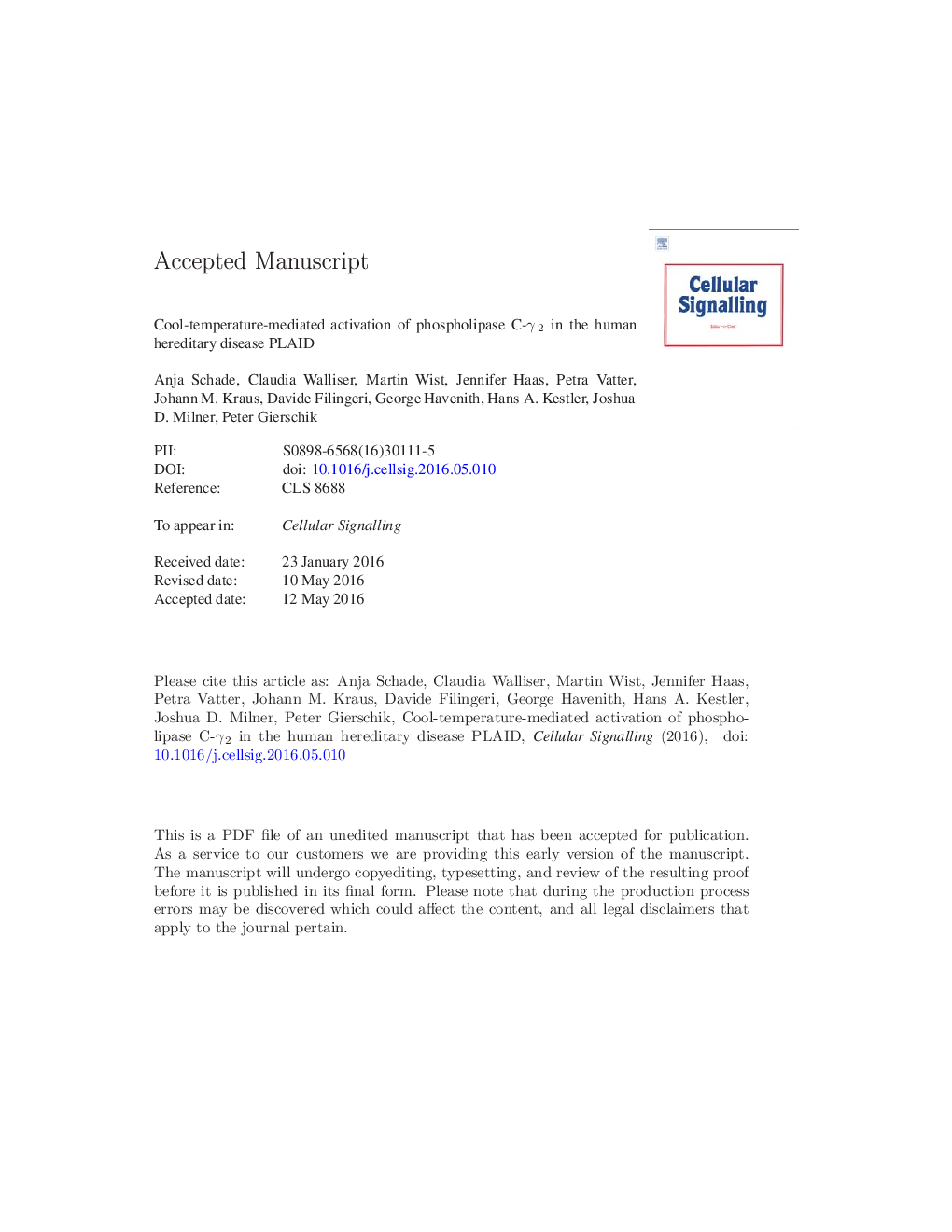| کد مقاله | کد نشریه | سال انتشار | مقاله انگلیسی | نسخه تمام متن |
|---|---|---|---|---|
| 10815025 | 1058443 | 2016 | 44 صفحه PDF | دانلود رایگان |
عنوان انگلیسی مقاله ISI
Cool-temperature-mediated activation of phospholipase C-γ2 in the human hereditary disease PLAID
دانلود مقاله + سفارش ترجمه
دانلود مقاله ISI انگلیسی
رایگان برای ایرانیان
کلمات کلیدی
SH3Inositol phospholipidphospholipase C-γ2SPPHPtdInsSH2PCIPLCBCRTrpRACPhosphatidylinositol 4-phosphate - Phosphatidylinositol 4-فسفاتPtdIns(4)P - PtdIns (4) PPtdIns(4,5)P2 - PtdIns (4،5) P2amino acid - آمینو اسیدPleckstrin homology domain - دامنه هماهنگی PleckstrinSrc homology domain 2 - دامنه وابستگی Src 2Src homology domain 3 - دامنه وابستگی Src 3phosphatidylinositol - فسفاتیدیل اینوزیتولphosphatidylinositol 4,5-bisphosphate - فسفاتیدیلینوزیتول 4،5-بیسفسفاتAutoinhibition - مهار خودکارRAS-related C3 botulinum toxin substrate - وابسته به RAS وابسته به سم بوتولینوم توکسینtransient receptor potential - پتانسیل گیرنده گذراPlaid - پلیدیControl - کنترلB cell receptor - گیرنده سلول B
موضوعات مرتبط
علوم زیستی و بیوفناوری
بیوشیمی، ژنتیک و زیست شناسی مولکولی
زیست شیمی
پیش نمایش صفحه اول مقاله

چکیده انگلیسی
Deletions in the gene encoding signal-transducing inositol phospholipid-specific phospholipase C-γ2 (PLCγ2) are associated with the novel human hereditary disease PLAID (PLCγ2-associated antibody deficiency and immune dysregulation). PLAID is characterized by a rather puzzling concurrence of augmented and diminished functions of the immune system, such as cold urticaria triggered by only minimal decreases in temperature, autoimmunity, and immunodeficiency. Understanding of the functional effects of the genomic alterations at the level of the affected enzyme, PLCγ2, is currently lacking. PLCγ2 is critically involved in coupling various cell surface receptors to regulation of important functions of immune cells such as mast cells, B cells, monocytes/macrophages, and neutrophils. PLCγ2 is unique by carrying three Src (SH) and one split pleckstrin homology domain (spPH) between the two catalytic subdomains (spPHn-SH2n-SH2c-SH3-spPHc). Prevailing evidence suggests that activation of PLCγ2 is primarily due to loss of SH-region-mediated autoinhibition and/or enhanced plasma membrane translocation. Here, we show that the two PLAID PLCγ2 mutants lacking portions of the SH region are strongly (> 100-fold), rapidly, and reversibly activated by cooling by only a few degrees. We found that the mechanism(s) underlying PLCγ2 PLAID mutant activation by cool temperatures is distinct from a mere loss of SH-region-mediated autoinhibition and dependent on both the integrity and the pliability of the spPH domain. The results suggest a new mechanism of PLCγ activation with unique thermodynamic features and assign a novel regulatory role to its spPH domain. Involvement of this mechanism in other human disease states associated with cooling such as exertional asthma and certain acute coronary events appears an intriguing possibility.
ناشر
Database: Elsevier - ScienceDirect (ساینس دایرکت)
Journal: Cellular Signalling - Volume 28, Issue 9, September 2016, Pages 1237-1251
Journal: Cellular Signalling - Volume 28, Issue 9, September 2016, Pages 1237-1251
نویسندگان
Anja Schade, Claudia Walliser, Martin Wist, Jennifer Haas, Petra Vatter, Johann M. Kraus, Davide Filingeri, George Havenith, Hans A. Kestler, Joshua D. Milner, Peter Gierschik,